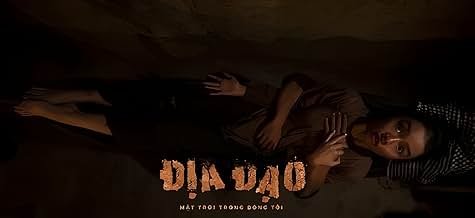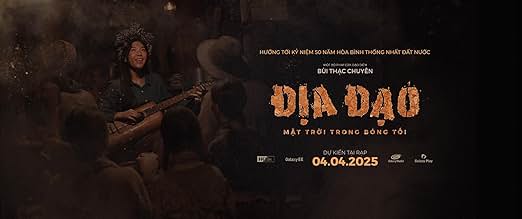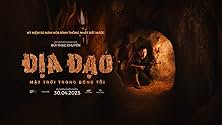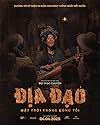Ajouter une intrigue dans votre langueIn 1967, as the Vietnam War raged, a Vietnamese revolutionary guerrilla team became the U.S. military's top target - charged with safeguarding a secret group of intelligence agents at all co... Tout lireIn 1967, as the Vietnam War raged, a Vietnamese revolutionary guerrilla team became the U.S. military's top target - charged with safeguarding a secret group of intelligence agents at all costs.In 1967, as the Vietnam War raged, a Vietnamese revolutionary guerrilla team became the U.S. military's top target - charged with safeguarding a secret group of intelligence agents at all costs.
- Réalisation
- Scénario
- Casting principal
Avis à la une
I'm a Vietnamese born in peacetime-even my parents' generation didn't really witness the full consequences of our long resistance wars. I only knew about the wars against the French and the Americans through school lessons and bits of information on social media.
But 'Tunnel' really hit me. It completely shifted my perspective on war. The film powerfully depicts the toughness and resilience of the people in the Cu Chi tunnels in particular, and the Vietnamese people of that time in general; as well a. The 250 kilometers of dark, suffocating tunnels beneath the ground were where they lived, planned, and prepared to fight back against American forces with tanks and advanced weapons. That's how we've come to have the peaceful life we live today, and I'm deeply grateful for that.
The use of period-specific language was a nice touch. There's one intimate scene in the film that was very tastefully done and felt true to the character's humanity. And it doesn't over-glorify the Vietnamese side, nor does it vilify the Americans-U. S. soldiers are portrayed as tough and skilled fighters.
The color grading in the film is beautiful. I'm not entirely sure how others might view this film-I studied at an art school and have some understanding of cinema, but with any film, different people will connect with it in different ways. Personally, I found it deeply impressive-both in terms of the director's craft and the stories told in and around the film.
But 'Tunnel' really hit me. It completely shifted my perspective on war. The film powerfully depicts the toughness and resilience of the people in the Cu Chi tunnels in particular, and the Vietnamese people of that time in general; as well a. The 250 kilometers of dark, suffocating tunnels beneath the ground were where they lived, planned, and prepared to fight back against American forces with tanks and advanced weapons. That's how we've come to have the peaceful life we live today, and I'm deeply grateful for that.
The use of period-specific language was a nice touch. There's one intimate scene in the film that was very tastefully done and felt true to the character's humanity. And it doesn't over-glorify the Vietnamese side, nor does it vilify the Americans-U. S. soldiers are portrayed as tough and skilled fighters.
The color grading in the film is beautiful. I'm not entirely sure how others might view this film-I studied at an art school and have some understanding of cinema, but with any film, different people will connect with it in different ways. Personally, I found it deeply impressive-both in terms of the director's craft and the stories told in and around the film.
10DKQ-0
Watching The Underground Passage by director Bui Thac Chuyen stirs a deep and powerful wave of emotions-intense, haunting, and profoundly moving. The film is not merely a cinematic experience; it's an emotional journey that draws the viewer into a hidden current beneath the surface, guiding them through shadowy frames filled with tension and quiet despair.
Emotions rise as we witness the resilience and unyielding spirit of people pushed to the very edge. There are moments that tighten the chest-acts of sacrifice, loneliness, and fleeting glimpses of love and hope glimmering in the darkness. Every sound, every ray of light piercing through the cracks in the earth feels like it touches something raw within, evoking deep reflections on war, humanity, and memory.
The Underground Passage doesn't scream-it whispers, but its echoes linger long after the credits roll. The feelings it stirs remain: a quiet ache, a mixture of pride and sorrow, and a profound reminder of what must not be forgotten.
Emotions rise as we witness the resilience and unyielding spirit of people pushed to the very edge. There are moments that tighten the chest-acts of sacrifice, loneliness, and fleeting glimpses of love and hope glimmering in the darkness. Every sound, every ray of light piercing through the cracks in the earth feels like it touches something raw within, evoking deep reflections on war, humanity, and memory.
The Underground Passage doesn't scream-it whispers, but its echoes linger long after the credits roll. The feelings it stirs remain: a quiet ache, a mixture of pride and sorrow, and a profound reminder of what must not be forgotten.
A short and succinct summary of one of many battles conducted during the VN war. Dark and realistic, director Chuyen takes artistic liberties yet still fully immerse audience in VN in the 1900s. The cast was a fresh and enthusiastic ensemble which brought a much needed breath of fresh air to the acting quality. The story, although rough around the edges, paints a lovely picture of the patriotism and humanity of the characters (more like children) involved in the preservation of indepence. The ending was artisticly beautiful, albeit I believe it leaves audience with more emotions than actual answers, conclusive endings to the stories told.
Politically, the film echoes the tone of past propaganda cinema-drawing a clear, almost cartoonish line between the heroic, morally flawless Vietnamese fighters and the evil, inhuman enemy. Such reductionist storytelling undermines the very complexity of history, turning real human suffering into scripted spectacle. Modern audiences, especially younger generations who have grown up with access to global perspectives, no longer respond to one-sided narratives. They seek stories with depth, vulnerability, and moral ambiguity-something dia dao completely lacks.
More importantly, the film weaponizes patriotism in a heavy-handed way. Rather than trusting viewers to feel national pride through authentic, human storytelling, it forces them into admiration with loud speeches, dramatic music, and hollow symbols. In doing so, it disrespects the intelligence of its audience and, paradoxically, cheapens the very ideals it sets out to honor.
More importantly, the film weaponizes patriotism in a heavy-handed way. Rather than trusting viewers to feel national pride through authentic, human storytelling, it forces them into admiration with loud speeches, dramatic music, and hollow symbols. In doing so, it disrespects the intelligence of its audience and, paradoxically, cheapens the very ideals it sets out to honor.
The concept is terrific-a war movie crafted with a setting and perspective that, at times, evoke the atmosphere of a horror film.
To bring this vision to life, Bui Thac Chuyen shows remarkable restraint, opting for a minimalist yet impactful approach-from the acting and sparse dialogue to the subtle use of patriotic symbolism. It's rare to see a Vietnamese director place such trust in the audience's ability to interpret and feel.
Unfortunately, the editing undermines much of that intention. Some scenes are difficult to follow, while others verge on unintentionally comedic due to awkward cut timing. Most frustrating of all, the dialogue is often hard to hear. As a native Vietnamese speaker, I found it absurd that I had to rely on English subtitles just to understand what the characters were saying.
That said, it's still refreshing to see a Vietnamese film with a clear, confident identity-one that doesn't depend on rapid-fire dialogues and petty arguments to move the plot forward.
To bring this vision to life, Bui Thac Chuyen shows remarkable restraint, opting for a minimalist yet impactful approach-from the acting and sparse dialogue to the subtle use of patriotic symbolism. It's rare to see a Vietnamese director place such trust in the audience's ability to interpret and feel.
Unfortunately, the editing undermines much of that intention. Some scenes are difficult to follow, while others verge on unintentionally comedic due to awkward cut timing. Most frustrating of all, the dialogue is often hard to hear. As a native Vietnamese speaker, I found it absurd that I had to rely on English subtitles just to understand what the characters were saying.
That said, it's still refreshing to see a Vietnamese film with a clear, confident identity-one that doesn't depend on rapid-fire dialogues and petty arguments to move the plot forward.
Le saviez-vous
- Versions alternativesAn alternate version, titled the Director's Cut, was released on April 30, 2025. This cut is 3 minutes shorter than the original theatrical version.
Meilleurs choix
Connectez-vous pour évaluer et suivre la liste de favoris afin de recevoir des recommandations personnalisées
Détails
Box-office
- Budget
- 2 240 000 $US (estimé)
- Montant brut mondial
- 6 641 870 $US
- Durée2 heures 8 minutes
- Couleur
- Mixage
- Rapport de forme
- 2.76 : 1
Contribuer à cette page
Suggérer une modification ou ajouter du contenu manquant



















